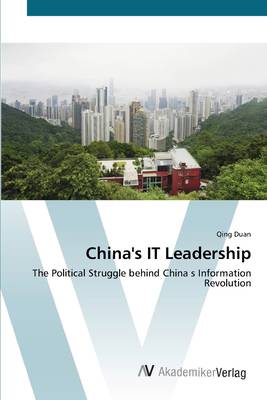
Bedankt voor het vertrouwen het afgelopen jaar! Om jou te bedanken bieden we GRATIS verzending (in België) aan op alles gedurende de hele maand januari.
- Afhalen na 1 uur in een winkel met voorraad
- In januari gratis thuislevering in België
- Ruim aanbod met 7 miljoen producten
Bedankt voor het vertrouwen het afgelopen jaar! Om jou te bedanken bieden we GRATIS verzending (in België) aan op alles gedurende de hele maand januari.
- Afhalen na 1 uur in een winkel met voorraad
- In januari gratis thuislevering in België
- Ruim aanbod met 7 miljoen producten
Zoeken
China's IT Leadership
The Political Struggle behind China's Information Revolution
Qing Duan
Paperback | Engels
€ 68,95
+ 137 punten
Omschrijving
Revision with unchanged content. Why has China moved so rapidly in its ICT sector? Who is behind the scene to break the monopoly of China Telecom and develop the ICT infrastructure? What are the political struggles involved in the buildup of the ICT sector in China? These are important issues addressed in this book. It is amazing that China has reached 162 million netizens, second only to the United States (211 million) by June 2007. This intrigued us to uncover the political struggles behind the breakup of China Telecom and the diffusion of the Internet to give a systematic explanation to the readers. The book concentrates on the role of leaders in order to burrow the process in which IT elites can devise, within limits, strategies to hasten trends in ICT diffusion, thus having a potential impact on political changes in China. In sum, this book is helpful for those who are interested in Chinese politics, state-society relationship, ICT diffusion, the middle class and leadership in China.
Specificaties
Betrokkenen
- Auteur(s):
- Uitgeverij:
Inhoud
- Aantal bladzijden:
- 292
- Taal:
- Engels
Eigenschappen
- Productcode (EAN):
- 9783639389678
- Verschijningsdatum:
- 28/05/2012
- Uitvoering:
- Paperback
- Formaat:
- Trade paperback (VS)
- Afmetingen:
- 152 mm x 229 mm
- Gewicht:
- 430 g

Alleen bij Standaard Boekhandel
+ 137 punten op je klantenkaart van Standaard Boekhandel
Beoordelingen
We publiceren alleen reviews die voldoen aan de voorwaarden voor reviews. Bekijk onze voorwaarden voor reviews.









